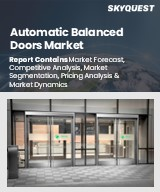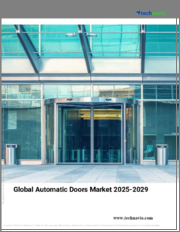
|
시장보고서
상품코드
1915854
자동 밸런스 도어 시장 규모, 점유율, 성장 분석 : 용도별, 재질별, 도어 유형별, 조작 방식별, 사이즈별, 지역별 - 업계 예측(2026-2033년)Automatic Balanced Doors Market Size, Share, and Growth Analysis, By Application (Industrial, Commercial), By Material (Metal, Wood), By Door Type, By Operation, By Size, By Region - Industry Forecast 2026-2033 |
||||||
세계의 자동 밸런스 도어 시장 규모는 2024년에 136억 7,000만 달러로 평가되며, 2025년 144억 9,000만 달러에서 2033년까지 231억 달러로 성장할 전망입니다. 예측 기간(2026-2033년)의 CAGR은 6%로 예측됩니다.
자동 밸런스 도어 세계 시장은 편의성, 안전성, 에너지 절약 솔루션에 대한 소비자 수요 증가에 힘입어 큰 폭의 성장이 예상됩니다. 주거 및 상업 부문 모두에서 자동화 시스템 도입이 증가하면서 이러한 확대에 크게 기여하고 있습니다. 또한 특히 신흥 시장에서의 건설 산업의 활기찬 성장은 수익성 높은 기회를 제공합니다. 에너지 절약과 지속가능한 건축 방식에 대한 관심은 자동 균형 도어 제조업체 시장 잠재력을 높이고 있습니다. 또한 음성 조작 기술 및 비접촉 기술의 보급 확대, 스마트홈 기술과의 통합이 진행되는 것은 업계의 새로운 동향을 보여주고 있습니다. 편의성, 에너지 효율성, 스마트 기술의 융합으로 자동 균형 문은 현대 인프라의 필수 요소로 자리매김하고 있습니다.
세계 자동밸런스 도어 시장 성장 촉진요인
에너지 절약과 지속가능한 건축 방식에 대한 관심이 높아지면서 자동 밸런싱 도어에 대한 수요가 크게 증가하고 있습니다. 이 혁신적인 문은 에너지 손실을 최소화하도록 설계되어 단열성 향상과 공기 교환량 감소에 기여합니다. 기업 및 공공기관이 환경 기준 달성 및 녹색건축물 인증 획득을 목표로 하는 가운데, 에너지 절약형 자동문 도입이 더욱 보편화되고 있습니다. 이러한 솔루션을 도입함으로써 조직은 운영 비용을 효과적으로 절감하는 동시에 환경 친화적 노력과 조화를 이룰 수 있습니다. 그 결과, 인프라 개발에서 지속가능성을 우선시하는 프로젝트가 늘어남에 따라 자동 밸런싱 도어 시장은 성장할 것으로 예측됩니다.
세계 자동발란스 도어 시장 성장 억제요인
세계 자동 균형문 시장은 특히 중소기업에게 장벽이 될 수 있는 높은 초기 비용과 관련된 몇 가지 제약에 직면해 있습니다. 예를 들어 중형 오피스 빌딩의 경우, 센서, 전동 도어, 기존 빌딩 시스템과의 통합 등 자동화 시스템 업그레이드에 필요한 많은 투자를 고려할 때, 그 비용을 정당화하기 어려운 경우가 많습니다. 이러한 자동화 솔루션은 장기적인 에너지 절감 효과를 가져올 수 있지만, 특히 예산이 최우선 순위인 프로젝트에서는 초기 비용 부담이 도입의 걸림돌로 작용할 수 있습니다. 이러한 재정적 장벽은 시장 침투를 제한하고 다양한 분야에서 첨단 도어 기술의 채택을 지연시킬 수 있습니다.
세계 자동 균형 도어 시장 동향
세계 자동 밸런스 도어 시장은 스마트 빌딩 기술과의 통합의 영향을 점점 더 많이 받아 자동화 솔루션의 혁신을 주도하고 있습니다. 더 많은 시설들이 운영 효율성, 예지보전, 에너지 관리의 향상을 추구함에 따라 IoT 지원 자동문에 대한 수요가 증가하고 있습니다. 이러한 추세는 상업, 의료, 산업 환경 등의 분야에서 스마트 빌딩으로의 광범위한 움직임과 일치합니다. 자동문이 다양한 빌딩 시스템과 연동하는 능력은 업무의 효율성을 높일 뿐만 아니라, 지속가능성을 위한 노력에도 도움이 됩니다. 이에 따라 각 제조업체들은 지능형 인프라의 진화하는 요구에 부응하기 위해 제품에 첨단 통신 기능을 우선적으로 도입하고 있습니다.
자주 묻는 질문
목차
서론
- 조사의 목적
- 조사 범위
- 정의
조사 방법
- 정보 조달
- 2차와 1차 데이터 방법
- 시장 규모 예측
- 시장 전제조건과 제한
개요
- 세계 시장 전망
- 공급과 수요 동향 분석
- 부문별 기회 분석
시장 역학과 전망
- 시장 규모
- 시장 역학
- 촉진요인과 기회
- 억제요인과 과제
- Porter의 산업 분석
주요 시장 인사이트
- 주요 성공 요인
- 경쟁의 정도
- 주요 투자 기회
- 시장 에코시스템
- 시장의 매력 지수(2025년)
- PESTEL 분석
- 거시경제 지표
- 밸류체인 분석
- 가격 분석
세계의 자동 밸런스 도어 시장 규모 : 용도별 & CAGR(2026-2033)
- 산업용
- 상업용
- 공공 시설용
- 주택용
세계의 자동 밸런스 도어 시장 규모 : 소재별 & CAGR(2026-2033)
- 금속
- 목재
- 유리
- 복합재
세계의 자동 밸런스 도어 시장 규모 : 도어 유형별 & CAGR(2026-2033)
- 싱글 도어
- 더블 도어
- 슬라이딩 도어
- 폴딩 도어
세계의 자동 밸런스 도어 시장 규모 : 조작별 & CAGR(2026-2033)
- 수동식
- 자동식
- 반자동식
세계의 자동 밸런스 도어 시장 규모 : 사이즈별 & CAGR(2026-2033)
- 소형
- 중형
- 대형
세계의 자동 밸런스 도어 시장 규모 & CAGR(2026-2033)
- 북미
- 미국
- 캐나다
- 유럽
- 독일
- 스페인
- 프랑스
- 영국
- 이탈리아
- 기타 유럽 지역
- 아시아태평양
- 중국
- 인도
- 일본
- 한국
- 기타 아시아태평양
- 라틴아메리카
- 브라질
- 기타 라틴아메리카 지역
- 중동 및 아프리카
- GCC 국가
- 남아프리카공화국
- 기타 중동 및 아프리카
경쟁 정보
- 상위 5사의 비교
- 주요 기업의 시장 포지셔닝(2025년)
- 주요 시장 기업이 채택한 전략
- 최근 시장 동향
- 기업의 시장 점유율 분석(2025년)
- 주요 기업의 기업 개요
- 기업의 상세
- 제품 포트폴리오 분석
- 기업의 부문별 점유율 분석
- 매출의 전년대비 비교(2023-2025년)
주요 기업 개요
- ASSA ABLOY(Sweden)
- dormakaba International Holding AG(Switzerland)
- Nabtesco Corporation(NABCO)(Japan)
- Horton Automatics(USA)
- Stanley Access Technologies LLC(USA)
- GEZE GmbH(Germany)
- TORMAX(Switzerland)
- DAWSON Metal(USA)
- FAAC Group(Italy)
- Grupsa(Spain)
- Royal Boon Edam International B.V.(Netherlands)
- Record(Switzerland)
- Gilgen Door Systems(Switzerland)
- Hermann(Germany)
- Automatic Systems(Belgium)
- Besam(Sweden)
- C.R. Laurence(CRL)(USA)
- VEZE Automatic Door Co., Ltd.(China)
- Baze Automation System(China)
- Door Control Technology(DCT)(USA)
결론과 제안
KSA 26.02.04Global Automatic Balanced Doors Market size was valued at USD 13.67 Billion in 2024 and is poised to grow from USD 14.49 Billion in 2025 to USD 23.1 Billion by 2033, growing at a CAGR of 6% during the forecast period (2026-2033).
The global market for automatic balanced doors is poised for significant growth, primarily fueled by increasing consumer demand for convenience, safety, and energy-efficient solutions. The rising adoption of automated systems in both residential and commercial sectors significantly contributes to this expansion. Furthermore, the vibrant growth of the construction industry, especially in emerging markets, presents lucrative opportunities. An emphasis on energy reduction and sustainable building practices enhances the market potential for manufacturers of automatic balanced doors. Additionally, the growing acceptance of voice-activated and touchless technologies, alongside the integration of smart home innovations, represents emerging trends in the industry. This convergence of convenience, energy efficiency, and smart technology positions automatic balanced doors as essential elements in modern infrastructure.
Top-down and bottom-up approaches were used to estimate and validate the size of the Global Automatic Balanced Doors market and to estimate the size of various other dependent submarkets. The research methodology used to estimate the market size includes the following details: The key players in the market were identified through secondary research, and their market shares in the respective regions were determined through primary and secondary research. This entire procedure includes the study of the annual and financial reports of the top market players and extensive interviews for key insights from industry leaders such as CEOs, VPs, directors, and marketing executives. All percentage shares split, and breakdowns were determined using secondary sources and verified through Primary sources. All possible parameters that affect the markets covered in this research study have been accounted for, viewed in extensive detail, verified through primary research, and analyzed to get the final quantitative and qualitative data.
Global Automatic Balanced Doors Market Segments Analysis
Global Automatic Balanced Doors Market is segmented by Application, Material, Door Type, Operation, Size and region. Based on Application, the market is segmented into Industrial, Commercial, Institutional and Residential. Based on Material, the market is segmented into Metal, Wood, Glass and Composite. Based on Door Type, the market is segmented into Single Door, Double Door, Sliding Door and Folding Door. Based on Operation, the market is segmented into Manual, Automatic and Semi-Automatic. Based on Size, the market is segmented into Small, Medium and Large. Based on region, the market is segmented into North America, Europe, Asia Pacific, Latin America and Middle East & Africa.
Driver of the Global Automatic Balanced Doors Market
The increasing emphasis on energy efficiency and sustainable building practices is significantly driving the demand for automatic balanced doors. These innovative doors are designed to minimize energy loss, contributing to enhanced insulation and reduced air exchange. As businesses and public institutions strive to meet environmental standards and achieve green building certifications, the adoption of energy-efficient automatic doors becomes more prevalent. By integrating these solutions, organizations can effectively lower their operating costs while aligning with eco-friendly initiatives. Consequently, the market for automatic balanced doors is poised for growth as more projects prioritize sustainability in their infrastructure developments.
Restraints in the Global Automatic Balanced Doors Market
The Global Automatic Balanced Doors market faces several constraints, particularly related to high initial costs that can be prohibitive for small businesses. For instance, mid-sized office buildings often struggle to justify the expense of upgrading to automated systems, given the significant investment required for components such as sensors, motorized doors, and integration with existing building systems. Although these automated solutions may offer long-term energy savings, the upfront financial burden can deter implementation, especially in projects where budget considerations are paramount. This financial barrier can limit market penetration and slow the adoption of advanced door technologies in various sectors.
Market Trends of the Global Automatic Balanced Doors Market
The Global Automatic Balanced Doors market is increasingly influenced by the integration of smart building technologies, driving innovation in automation solutions. As more facilities seek to enhance operational efficiency, predictive maintenance, and energy management, the demand for IoT-capable automatic doors is rising. This trend aligns with the broader movement toward smart buildings in sectors such as commercial, healthcare, and industrial environments. The ability of automatic doors to interact with various building systems not only streamlines operations but also supports sustainability initiatives. Consequently, manufacturers are prioritizing advanced communication features in their products to meet the evolving demands of intelligent infrastructures.
Table of Contents
Introduction
- Objectives of the Study
- Scope of the Report
- Definitions
Research Methodology
- Information Procurement
- Secondary & Primary Data Methods
- Market Size Estimation
- Market Assumptions & Limitations
Executive Summary
- Global Market Outlook
- Supply & Demand Trend Analysis
- Segmental Opportunity Analysis
Market Dynamics & Outlook
- Market Overview
- Market Size
- Market Dynamics
- Drivers & Opportunities
- Restraints & Challenges
- Porters Analysis
- Competitive rivalry
- Threat of substitute
- Bargaining power of buyers
- Threat of new entrants
- Bargaining power of suppliers
Key Market Insights
- Key Success Factors
- Degree of Competition
- Top Investment Pockets
- Market Ecosystem
- Market Attractiveness Index, 2025
- PESTEL Analysis
- Macro-Economic Indicators
- Value Chain Analysis
- Pricing Analysis
Global Automatic Balanced Doors Market Size by Application & CAGR (2026-2033)
- Market Overview
- Industrial
- Commercial
- Institutional
- Residential
Global Automatic Balanced Doors Market Size by Material & CAGR (2026-2033)
- Market Overview
- Metal
- Wood
- Glass
- Composite
Global Automatic Balanced Doors Market Size by Door Type & CAGR (2026-2033)
- Market Overview
- Single Door
- Double Door
- Sliding Door
- Folding Door
Global Automatic Balanced Doors Market Size by Operation & CAGR (2026-2033)
- Market Overview
- Manual
- Automatic
- Semi-Automatic
Global Automatic Balanced Doors Market Size by Size & CAGR (2026-2033)
- Market Overview
- Small
- Medium
- Large
Global Automatic Balanced Doors Market Size & CAGR (2026-2033)
- North America (Application, Material, Door Type, Operation, Size)
- US
- Canada
- Europe (Application, Material, Door Type, Operation, Size)
- Germany
- Spain
- France
- UK
- Italy
- Rest of Europe
- Asia Pacific (Application, Material, Door Type, Operation, Size)
- China
- India
- Japan
- South Korea
- Rest of Asia-Pacific
- Latin America (Application, Material, Door Type, Operation, Size)
- Brazil
- Rest of Latin America
- Middle East & Africa (Application, Material, Door Type, Operation, Size)
- GCC Countries
- South Africa
- Rest of Middle East & Africa
Competitive Intelligence
- Top 5 Player Comparison
- Market Positioning of Key Players, 2025
- Strategies Adopted by Key Market Players
- Recent Developments in the Market
- Company Market Share Analysis, 2025
- Company Profiles of All Key Players
- Company Details
- Product Portfolio Analysis
- Company's Segmental Share Analysis
- Revenue Y-O-Y Comparison (2023-2025)
Key Company Profiles
- ASSA ABLOY (Sweden)
- Company Overview
- Business Segment Overview
- Financial Updates
- Key Developments
- dormakaba International Holding AG (Switzerland)
- Company Overview
- Business Segment Overview
- Financial Updates
- Key Developments
- Nabtesco Corporation (NABCO) (Japan)
- Company Overview
- Business Segment Overview
- Financial Updates
- Key Developments
- Horton Automatics (USA)
- Company Overview
- Business Segment Overview
- Financial Updates
- Key Developments
- Stanley Access Technologies LLC (USA)
- Company Overview
- Business Segment Overview
- Financial Updates
- Key Developments
- GEZE GmbH (Germany)
- Company Overview
- Business Segment Overview
- Financial Updates
- Key Developments
- TORMAX (Switzerland)
- Company Overview
- Business Segment Overview
- Financial Updates
- Key Developments
- DAWSON Metal (USA)
- Company Overview
- Business Segment Overview
- Financial Updates
- Key Developments
- FAAC Group (Italy)
- Company Overview
- Business Segment Overview
- Financial Updates
- Key Developments
- Grupsa (Spain)
- Company Overview
- Business Segment Overview
- Financial Updates
- Key Developments
- Royal Boon Edam International B.V. (Netherlands)
- Company Overview
- Business Segment Overview
- Financial Updates
- Key Developments
- Record (Switzerland)
- Company Overview
- Business Segment Overview
- Financial Updates
- Key Developments
- Gilgen Door Systems (Switzerland)
- Company Overview
- Business Segment Overview
- Financial Updates
- Key Developments
- Hermann (Germany)
- Company Overview
- Business Segment Overview
- Financial Updates
- Key Developments
- Automatic Systems (Belgium)
- Company Overview
- Business Segment Overview
- Financial Updates
- Key Developments
- Besam (Sweden)
- Company Overview
- Business Segment Overview
- Financial Updates
- Key Developments
- C.R. Laurence (CRL) (USA)
- Company Overview
- Business Segment Overview
- Financial Updates
- Key Developments
- VEZE Automatic Door Co., Ltd. (China)
- Company Overview
- Business Segment Overview
- Financial Updates
- Key Developments
- Baze Automation System (China)
- Company Overview
- Business Segment Overview
- Financial Updates
- Key Developments
- Door Control Technology (DCT) (USA)
- Company Overview
- Business Segment Overview
- Financial Updates
- Key Developments



















